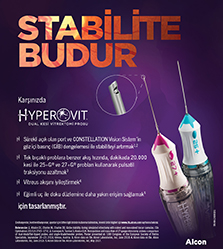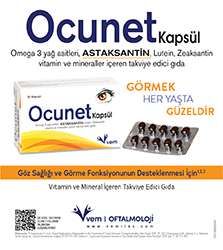2MD, Hisar Intercontinental Hospital, Department of Ophthalmology, Istanbul, Turkey
3MD, Istanbul Sultan Abdulhamid Han Training and Research Hospital, Department of Ophthalmology, Istanbul, Turkey DOI : 10.37845/ret.vit.2021.30.26 Purpose: To evaluate the effi cacy and safety of intravitreal dexamethasone implant (IDI) (OZURDEX) in the patients with diabetic macular edema (DME) resistant to anti-VEGF treatment.
Study Design: This retrospective study included 93 eyes of 93 patients who underwent IDI injection and changes in best corrected visual acuity (BCVA), central macular thickness (CMT), intraocular pressure (IOP) as well as presence of DME and ocular side effects were investigated.
Results: Ninety three eyes of 93 patients (45 male, 48 female; the mean age was 67.32±10.68 years) were included. At least fi ve monthly intravitreal ranibizumab (Lucentis) injections were administered before IDI and patients were considered to have resistant DME. A signifi cant improvement was observed in BCVA while a signifi cant decrease in CMT at all time points when compared to baseline (p<0.05). The maximum effect of IDI was seen on month 3, which was decreased gradually decreased after month 3. The mean IOP value was increased from 15.2±2.85 mmHg to 16.13±2.83 on month 6. The IOP elevation was controlled with topical anti-glaucomatous medication. Of the eyes included, 31 were phakic while 62 were pseudophakic and no cataract formation was detected in the patients during follow-up.
Conclusion: In this study, it was shown that IDI provided signifi cant improvement in BCVA, DME and CMT. The effect was highest on month 3; however, the effi cacy was maintained on month 6 in some patients. Although IDI treatment was found effective and safe in patients with anti-VEGF resistant DME, there is a need for studies with longer follow-up.
Keywords : Intravitreal dexamethasone implant, Ddiabetic macular edema, Anti-VEGF therapy



